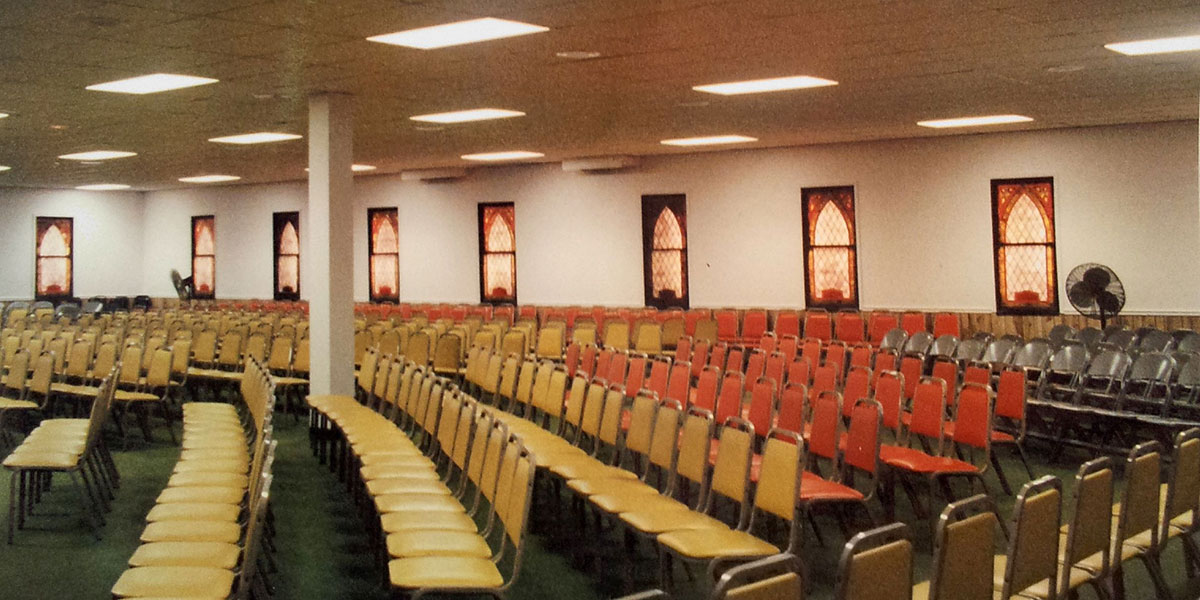From DeLozier Chapel in the basement of the Field Academic Hall to state-of-the-art services in the Pillsbury Chapel and Dale Williams Fine Arts Center, many aspects of this sacred service have changed while core values mirror MBU’s foundational heritage.
Photo by: University Communications
Fake stained glass windows adorn the former Delozier Chapel, which is now the Records Office in the basement of the Field Academic Hall. Even with such basic facilities, staff and faculty worked hard to create a sacred environment.
__________________________________________________
Come on in, scan your ID, you have three free skips, listen to various speakers for an hour.
What does this describe? Chapel.
As one of the most foundational practices in MBU’s history, has the content of chapel changed over the years or is it basically the same?
Jonathan White, campus minister, offered some key insights to the yearly substance of chapel services.
“Chapel is a combination of convocation and chapel-style services, so the content can be different each time,” White said. “However, there is a chapel theme each year and this theme is given to the chapel speakers as they prepare their talks. The content is Christ-centered even though the topics may vary.”
Andy Chambers, senior vice president for student development and associate provost, described enhancements to chapel over his 14 years working for MBU.
“We did a lot of the same things like praise and worship, preaching, lecture, speaker series and historical society,” Chambers said. “We had no full-time ministry staff for awhile but now we have a scholarshipped chapel band, ministry teams, cutting edge audio and video equipment and a yearly speaker budget.”
Chambers went on to explain that the Communications Department is now fully integrated into chapel services with professional video recordings for each service.
The Communications Department also airs weekly campus news videos, MBU Timeline Broadcast, before each service.
Over Chambers’ time on campus, chapel attendance has tripled.
Having access to such elaborate resources truly helps chapel reach a growing demographic.
The music, itself, has also changed.
“There are different styles of music in chapel. Some may be contemporary in nature and others may be traditional, but all styles glorify Jesus,” White said.
Chambers explained that when chapel services were held in DeLozier Chapel, the music consisted of maybe two or three SpiritWing members performing an acoustic set.
Now, each chapel can showcase a variety of different performing groups including chapel band, ministry groups, Chorale, Chamber Singers or Ringers.
As you can see, both musical and lecture varieties in chapel have truly blossomed.
One of the most discussed aspects of chapel is the structure of the service.
What do Chambers and White have to say about the diverse variety of services?
“The structure has pretty much stayed similar throughout the years. Since chapel is 45 minutes, there is little room to play with,” White said. “However, some chapel may be all worship music while some may be all speaking.”
Some services are convocations rather than worship services.
According to Merriam Webster dictionary a convocation is “a meeting of the members of a college or university to observe a particular ceremony (such as the beginning of the school year or announcing awards and honors).”
The issue with incorporating these academic-inspired services is the abrupt interruption of student expectations for worship services.
Chambers gave some intriguing detail behind the purpose and nature of these less-than-popular services.
“Because we are a liberal arts university we do include some convocation-style services into our chapel schedule each semester,” Chambers said. “I don’t expect students to understand such a different type of service, but I do wish we could communicate the importance of meeting opinion leaders in St. Louis.”
Chambers explained that he completely understands how students become used to the routine of worship-oriented services.
Walking into a totally different chapel service unaware of the purpose can be jarring. At the same time, he sees the intentionality from a behind-the-scenes perspective.
Perhaps the greatest asset to weekly chapel services is the opportunity to share the gospel with hundreds of unchurched young adults.
Stories of redemption, forgiveness and changed lives are a yearly result of required chapel services.
“Many students have talked about how chapel has impacted them. This has been a great impact to me,” Chambers said.
“One particular student would come to chapel drunk often. During one particular service he accepted Jesus as his Lord and Savior and is now a missionary and church leader,” White said.
MBU pairs an open enrollment policy with required chapel service, providing the opportunity to reveal Biblical truth to a very anti-church generation.
“Only the Lord opens the heart. We know that slightly over half of our students have a church background. For hundreds of students, this is the only time they will ever hear the gospel,” Chambers said.
From simple beginnings in the basement of the Field Academic Hall with chairs crammed in and willing students singing acoustic melodies, to a fully furnished auditorium with weekly performers and highly respected speakers, chapel might look different from its humble beginnings but the heartfelt purpose remains the same.
